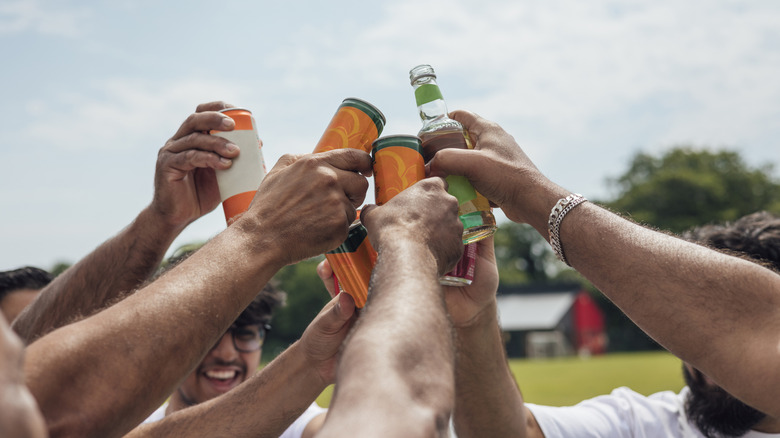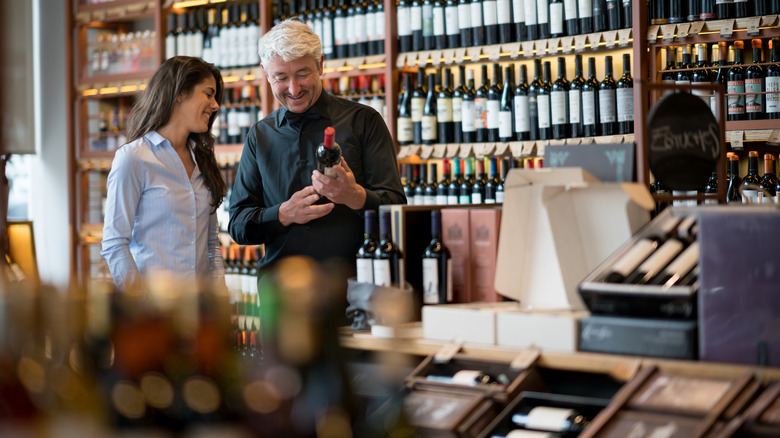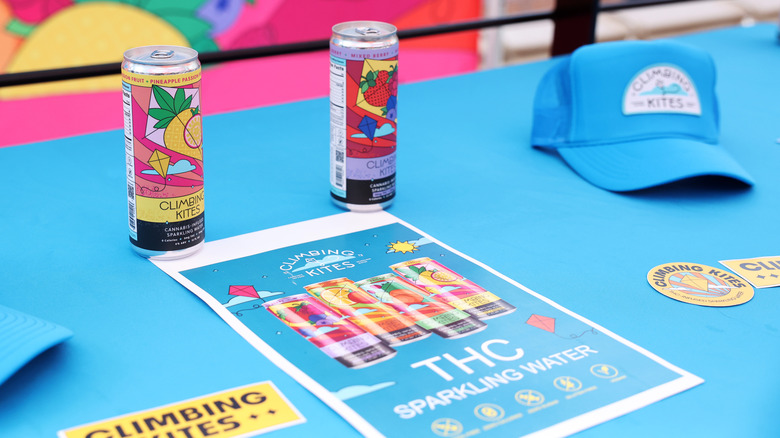The Sober-Curious Movement Is On The Rise
As people swap nights out on the town for nights in on the couch, drinking culture is on the decline. According to the National Beer Wholesalers Association, just 9% of the beer sold in the U.S. in 2023 came from kegs delivered to dining and drinking establishments. The rest was packaged or canned, likely to be enjoyed at home. But honestly, many people aren't really drinking beer anymore period. Americans consumed less beer in 2023 than they have in a generation, and spirit and wine sales also declined (via Think Global Health).
Gallup polls show that Americans are gradually taking on a more negative view of alcohol. With younger generations leading the change, these shifts aren't expected to slow. This all might seem like a pivot in personal habits, but it's also a signifier of greater changes to come. What we're seeing isn't just a phase; we're entering the slow rise of the sober-curious movement.
Sober curiosity is all about examining one's relationship with alcohol. The term, coined by author Ruby Warrington, describes people open to challenging social norms and de-centering alcohol from their lives. This can describe someone who participates in Dry January, engages in activities that do not focus on alcohol consumption, or generally reaches for non-alcoholic alternatives. This movement gained steam after the pandemic. Some turned to alcohol to deal with the stress of lockdown. Even though this period is behind us, we still saw lasting effects. Now, a switch has been flipped. People are still staying home more than they used to, but the drinking part of this equation is falling away.
Different factors have sparked the shift toward sobriety
In many cases, drinking is still at the core of social life. From a nightcap at a local bar to a weekend trip to the brewery, it's hard to escape alcohol. Drinking helps us break down social barriers that otherwise might restrain us from socializing, so it has its benefits. But in the comfort of our own homes, we don't really need to release inhibitions. Why put up with hangovers and headaches if we're simply looking for a way to wind down at home? We already feel comfortable, so we'll swap a glass of red for a soda, tea, or non-alcoholic wine. Now we have even more options.
It's not just the rise of homebodies that has driven a shift toward sobriety. New businesses are popping up to fill the gaps in people's lives where alcohol once stood. This means newly sober people now have more options to turn to. While you could always buy a soda or other alcohol-free or non-alcoholic beverage off the grocery store shelf, you now have the option of heading to an exclusively non-alcoholic bottle shop. From dealcoholized wines to alcohol-free apéritifs, there's something in these stores for everyone, whether sober, sober-curious, or just generally curious.
Non-alcoholic bottle shops are on the rise
As designated non-alcoholic beverage shops pop up more and more across the United States, GlobalData predicts that the non-alcoholic spirit market will grow by 36.7% between 2024 and 2028. These stores offer a place for consumers to browse alternatives to traditional beer and wine. Whether sober or sober-curious, it's a big deal to have access to both safe options and expertise.
Some non-alcoholic wines, beers, and spirits mimic the flavor of alcoholic beverages, but others also imitate the effects. Instead of containing alcohol, these drinks come with ingredients like plant-based adaptogens that naturally lift your mood. These brands provide an ideal alternative to alcohol with similar flavors and effects, all while forgoing the usual negatives of drinking such as hangovers, headaches, organ damage, and more. It's not just small brands creating these drinks either. Even huge names from Heineken to Diageo, the latter of which represents alcohol brands like Smirnoff and Guinness, are ramping up their production of non-alcoholic alternatives.
Non-alcoholic alternatives are the future
Alcohol alternatives are a burgeoning industry, and it isn't stopping with drinks. Where people used to pick up a glass of wine after a stressful day at work, more people are turning to wellness products containing ingredients like CBD, kava, and ashwagandha, to name a few. From supplements to sweet gummies, lotions to sparkling waters, these products are available in all kinds of forms and are also encroaching on the alcohol market.
The world grows more overwhelming every day with its non-stop marketing campaigns, social media posts, loud public spaces, and more. Consumers are naturally growing more curious about the slow life and craving honest interactions without the interference of screens or alcohol. It's not that we're cutting alcohol out completely. According to NielsenIQ, 93% of people who purchase non-alcoholic alternatives still drink alcohol. They're just exploring what else the world has to offer.
So no, we haven't reached a completely sober societal norm yet. But clearly, sober curiosity is in.



